An extract from Michael Gawenda’s A.N Smith lecture, in which the former editor of The Age says that “the editors of The Age and The Sydney Morning Herald have no control over their papers’ websites. All the talk of newsroom integration is rendered meaningless as a result.”
Tag Archives: editor
Times are changing: an online jobs shuffle at Times Online
So, it’s all change at the Times and Times Online.
Anne Spackman, as reported last week, is now the comment editor of the main paper, after a spell as editor-in-chief at Times Online since 2006.
That role is not being replaced. Instead:
- Tom Whitwell, who is currently communities editor at Times Online, will be assistant editor of Times Online.
- Hector Arthur, who was previously the head of content development for Times Online, is the new head of digital development for the website.
Speaking in a press release, the Times’ editor, James Harding said: “Anne Spackman has done an extraordinary job at Times Online bringing our journalism to more people than at any time in our history.
“She has expanded the nature of what we do as a news organisation, introducing a 24/7 newsroom, launching The Times Archive and developing our podcasts, video and reader comments online”, he said.
Praising the new online assistant editor, Harding said that Tom Whitwell had “been one of the driving forces behind the phenomenal growth of Times journalism online and our audiences worldwide.”
The beast is unleashed: looking at Tina Brown’s new site
As reported all over the shop, yesterday saw the launch of the online news aggregator site, The Daily Beast, captained by former editor of Tatler, Vanity Fair and The NewYorker, Tina Brown, and backed by Barry Diller, of IAC/InterActiveCorp.
PaidContent had managed a sneak preview, but the likes of Roy Greenslade, and Journalism.co.uk had to wait till its official grand unveiling yesterday afternoon.
Named after the fictional tabloid in Evelyn Waugh’s 1938 novel, Scoop, Tina Brown describes The Daily Beast, on her site, as: “the omnivorous friend who hears about the best stuff and forwards it to you with a twist.”
Her motley crew boasts the satirist Chris Buckley, former McCain adviser Mark McKinnon, Project Runway’s Laura Bennett and Facebook’s Randi Zuckerberg.
The site’s bold red and black design has a large list of contributors and features a collection of news, opinion, blogs, links and video.
Over at Cyber Journalist Net they reckon it’s ‘about 30 percent original content’ and Gawker is having fun speculating about Brown’s spending habits.
Opinion in the US seems to be split on the site: Deadline Hollywood’s Nikki Finke thinks it ‘sucks’, but as the New York Observer points out she said that about Huffington as well.
Steve Johnson at the Chicago Tribune reckons there’s irony in the choice of title but doesn’t think that necessarily matters.
With absolutely no advertising on the site, it will be interesting to see whether The Daily Beast can survive in the online jungle. It seems to have had a lion’s share of initial hype at least.
Update: Le Carré’s past – as told on the web
I wrote a post yesterday which looked at how the story of author John le Carré’s alleged temptation to defect to the Russians during his time as a British Intelligence officer (as reported by the Sunday Times) was spreading over the web, despite Le Carré’s lengthy contention with the report.
Hari Kunzru, who wrote a review that referred to the Sunday Times report, in Saturday’s Guardian, has left a comment:
For the record, I wasn’t aware of Le Carré’s objections to Liddle’s interview. My review was filed before the letter was printed in The Times. I’m not surprised. Even from Liddle’s quote the inference that Le Carré ‘almost defected’ is hard to draw.
So either the Guardian Review’s editor didn’t know of Le Carré’s complaint either, or it was a conscious decision to leave it as Kunzru wrote it.
It does seem to suggest that complaints or letters published post-coverage don’t really rectify a situation. It’s lucky that Le Carré aka David J.M. Cornwell enjoyed the Calvados and Liddle’s ‘erudite and perceptive’ conversation, or there could have been rather more costly repercussions for the Sunday Times.
Editor&Publisher: Yahoo’s new newspaper ad platform
Yesterday Yahoo unveiled its new advertising management platform APT in front of analysts, advertisers, and the press – a ‘lynchpin’ behind its newspaper alliance.
Was the Scotsman right to sack Nick Clayton for blogging?
Earlier this week Journalism.co.uk picked up an update to Twitter from Nick Clayton, technology journalist, weekly tech columnist for the Scotsman, and recently signed-up blogger for Scottish media news website Allmediascotland (AMS):
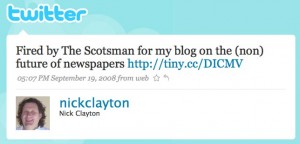
The blog post in question – published on Friday 19 – mentioned, amongst other things, Clayton’s attempts to sell his house and the following statement, which seems to have riled The Scotsman:
“All but one of the too many estate agents I spoke to told me not to bother advertising in The Scotsman. Whether you’re looking for work or a home, the web’s the place to go.”
Clayton was told he was fired by Alison Gray, editor of the paper’s Saturday magazine, just hours after the post was put live, with it cited as the key reason behind his sacking.
“I’d written a slightly controversial blog entry for allmediascotland.com suggesting that, as websites replace printed newspapers, there would be little need for physical offices and that the role of the sub-editor would disappear. I hoped it would be a little provocative, but the most I expected was to have a few virtual brickbats lobbed in my direction,” said Clayton, in a follow-up piece.
Journalism.co.uk tried contacting the Scotsman, leaving messages with Alison Gray and the office of Tim Bowdler, chief executive of Scotsman Publications, but received no response to the following:
– does the Scotsman have a set policy on staff writing for external websites? and are journalists aware of this?
– could the blog post have been amended to prevent Clayton from losing his job?
– why was Clayton sacked for his comments on the state of print advertising after the Scotsman itself ran the story ‘Johnston Press hit by house market woes as property advertising slides’ on August 28?
Admittedly there’s no disclaimer on Clayton’s AMS blog – e.g. ‘the views expressed here are my own and do not reflect those of my employer’ etc etc – but nevertheless was this the right course of action for the Scotsman to take?
There’s nothing to stop a journalist from setting up their own personal blog or contributing in their professional capacity to another blog site – either as poster or commenter – and as the trend for doing so continues to grow more popular, will publishers start setting out stricter guidelines for what staff can and can’t say elsewhere?
Reactions like this and the idea of more stringent restrictions on where journalists can write online are counterproductive: letting journalists write, comment, engage and react with colleagues and readers online can help build an online community around them and their content, driving users back to the publisher’s site.
Spilling company secrets is one thing, but Clayton’s post was hardly exposing something that’s hidden from the rest of the newspaper industry.
Clayton has told me he’s contacted the National Union for Journalists (NUJ) (who haven’t got back to me either for that matter) – and I’ll be really interested to hear its stance on this: firstly, in reaction to the immediacy of his sacking; and more importantly, as to what this means for journalists working online, in multimedia and for multiple taskmasters.
Your chance to vote in the American election without citizenship
We could hardly resist putting this pretty map up here, and the motive behind its design makes it even better. The reason is arrived in our inboxes today is because the Economist is inviting the world to vote in the American presidential election in its Global Electoral College (GEC) – we can dream that it would have an impact, at least.
Now, this isn’t some kind of ‘let’s influence the silly Americans’ à la the Guardian’s G2 2004, but a rather nice re-drawing of the electoral map. In the new version 195 of the world’s countries get a say in the outcome of the next presidential election.
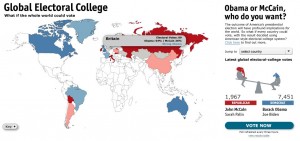
“America’s presidential campaign has fascinated people around the world, the Economist.com’s editor, Daniel Franklin said In the release accompanying the map. “Maddeningly, though, only Americans get to vote. But what if the entire world had a say?”
Although based on the American system, it aims to put pay to the significance of the swing vote (‘there are few countries whose votes in the GEC are a foregone conclusion’). The vote closes November 2 2008 when the results will be announced live in New York.
Online, users can look at the world map to see how each of candidates is doing on a global, and country-by-country basis, and find links to the Economist’s election analysis. Right now it’s looking pretty good for Obama. For starters he has 94 per cent of votes in India, 88 per cent of votes in Britain, and 86 per cent support him in China.
It gets more complicated than this, so visit the website for more details.
MediaGuardian: Journalist recruitment freeze at the Independent
In an interview with MediaGuardian, the Independent’s editor, Roger Alton, said that he will not be recruiting any more journalists on the title despite the increase in its cover price to £1.
Editor&Publisher (via AP): Washington Post’s new online political section links to rival newspapers
The Washington Post has launched a new web section that links readers to the best of political coverage, including that of their rivals.
Thoughts from the Ethnic Media Summit: where do we go now?
This week’s Guardian Ethnic Media Summit, supported by Channel 4 and Spectrum Radio was the first of its kind. The event itself may be new, but the common theme of the day seemed to be, ‘weren’t we having these conversations 10 years ago?’
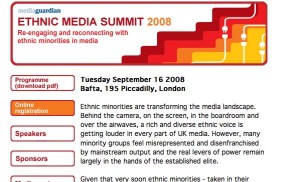
One of the speakers Claude Grunitzky talked about how the UK in 1996 had been a great place to be, to launch his magazine TRACE. Now, returning from the US – where he heads the TRUE Agency and the US edition of TRACE, and another publication TERRACE – he is not sure how much things have moved on. He went so far to say that the UK could be about 20 years behind in terms of ethnic representation in media. Ouch.
While many of the speakers focussed on the exciting times ahead for connecting with ethnic groups through social media (as we reported yesterday, Ofcom has found that the four main ethnic groups in the UK are using digital and online media more widely and diversely than the general population) there still seemed to be this pervading sense that some things hadn’t quite moved on.
News reporter Samira Ahmed, interviewed fellow Channel 4 colleague Aaqil Ahmed over his new appointment as the channel’s commissioning editor for religion and multicultural programming.
Her questions seemed to be weeding out whether this, too, might be a step backwards? After all, hadn’t the keynote speaker, Trevor Phillips, chair of the Equality and Human Rights council, just said that terms like ‘multicultural’ were dead?
“The feeling was that we need a champion,” Aaqil Ahmed answered. “The individual commissioning editors still want to make multicultural content, but alongside that I have a dedicated role.”
His advice, however, to young people from ethnic groups is to make other kinds of films before they try and reflect specific religious or ethnic content. He also cited BBC’s ‘Who Do You Think You Are?’ as one of the best multicultural programmes on television.
You can listen to the interview in full here (23 mins):
[audio:http://www.journalism.co.uk/sounds/AAquilAhmed.mp3]Various panel debates, with some big names in the ethnic (and mainstream) media world, discussed just exactly where we’re at, in terms of ethnic media: that’s on screen and off. Debates flitted between portrayal, participation and recruitment. It seems one feeds into the other.
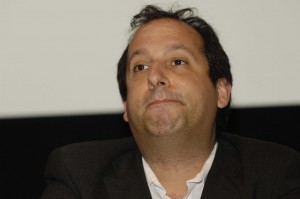
Although actress and comedian Meera Syal and Observer news editor Kamal Ahmed didn’t show up, there were a host of other interesting people to listen to, among them: a panel of inspiring young people who have been involved in Live magazine through the Livity project; Leslie Bunder the founder of the SomethingJewish network (pictured above, courtesy of Richard Cooke, Guardian News and Media); Parminder Vir OBE, the award winning film and television producer; Joseph Harker, assistant comment editor at the Guardian; and Jay Kandola, director of acquisitions at ITV (but also previously at BBC, Channel 4 and 5).
Blogger and Asians in Media editor, Sunny Hundal, managed the proceedings, with lots of his own questions thrown in. Guardian.co.uk editor-in-chief Emily Bell joked that Comment is Free would be very quiet with Sunny’s absence for a day. Trevor Phillips’ keynote speech (pictured below, courtesy of Richard Cooke, Guardian News and Media) made particularly interesting listening: you can read the Guardian’s coverage here.
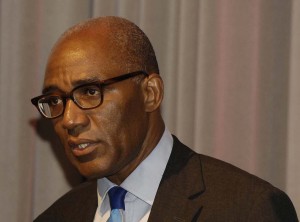
So: will things have moved on by next year? The big questions raised were how to best monetise ethnic media, do terms like ‘multicultural’ have a role in ethnic media, and how do you penetrate mainstream media with its very narrow horizons? Some speakers said that there was no point just replacing white, socially well-off, Oxbridge males with Oxbridge socially well-off males from ethnic backgrounds – issues of class representation were raised too.
In the very last panel debate about digital reinvention, Milica Pesic, from the Media Diversity Institute raised a good point: what’s the point of a panel all agreeing with each other? Next time, she wants the culprits who consistently misrepresent ethnic groups in the media up on the stage too. Hear, hear, I say. Let’s get the editor who commissioned the story about Polish people hunting swans up on the stage with the editor of Polot.co.uk, Julita Kaczmarek, and really get the debate going.
Finally, a small point picked up from Norrie, a blogger from Leith FM, a Scottish community radio station. He was invited to the Guardian’s Ethnic Summit too, but found the pricing scheme (even at the cheapest rate it was £364 per person) a little bit off-putting and not quite as inclusive as you might expect from an event about, well, inclusion.